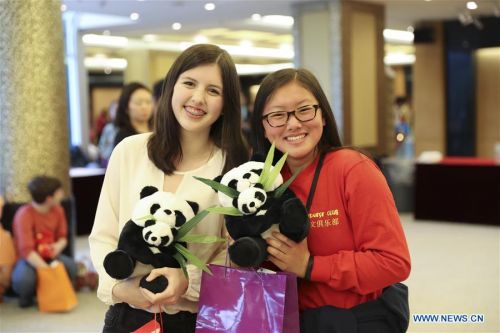
U.S. students pose for photos during the "Open Day - Experience China" event at the Chinese Consulate General in New York, the United States, on May 5, 2017. This event, organized by the Education Office of the Consulate, invited over 200 K-12 students and their principals, teachers and parents from schools in New York and New Jersey to join Chinese traditional activities, which provided an opportunity for them to know more about Chinese language and culture. (Xinhua/Wang Ying)
by Xinhua Writer Jiang Xufeng
BEIJING, May 9 (Xinhua) -- Complementarity has defined win-win results in Sino-U.S. bilateral economic ties, but collaboration must be expanded through multilaterism, according to both Chinese and U.S. economists.
HUGE POTENTIAL
Their complementary structures and economic size determines the growing bilateral ties, said Adam Posen, president of the Peterson Institute for International Economics (PIIE), a U.S. think tank.
China has a comparative advantage in labor-intensive industries and the United States has comparative advantages in capital-intensive industries and high-yield agriculture, Posen said.
As largest source of U.S. imports, China accounted for 46 percent of the U.S. deficit in trade of goods in 2016, but the bilateral trade balance has no meaning in terms of industrial competitiveness, he said at a roundtable symposium hosted by the China Fortune Media Group of Xinhua News Agency over the weekend.
"China is in a state of economic rebalancing, and improved Chinese domestic investment and consumption structure will help reduce the bilateral trade imbalances," he added.
"China and the United States are increasingly interdependent with shared interests. The world's two largest economies should not only pursue a trade balance, but focus on rules and policies for fair trade and create a more fair and reasonable competitive environment," Wei Liqun, former director of the State Council Research Office, said at the symposium.
"Both countries can develop deeper and more innovative complementary cooperation, especially in energy, infrastructure, high-tech and manufacturing sectors," Wei said.
The view was echoed by Posen, who noted that the two countries have fundamental opportunities in infrastructure, energy and climate change and among others, but the new U.S. government needs time to learn the value of international system and collaboration.
The two can strive to reach a "high-standard and realistic" bilateral investment agreement, while speeding up structural reform and opening up the market is China's best strategy to avoid economic conflict with the United States, Posen suggested.
He predicted the dollar would continue strengthening under market expectations of U.S. fiscal stimulus and interest rate hikes, noting that both countries had a common medium-term interest in avoiding a sharp U.S. dollar appreciation against the RMB.
MULTILATERAL PLATFORMS
U.S. President Donald Trump team's philosophy on trade is that trade deficits are bad and should be reduced and that bilateral negotiations are preferable to multilateral or regional ones, Posen noted.
The risks of such philosophy will be a return of non-tariff barriers and anti-dumping as well as challenges to the sustainability of the World Trade Organization (WTO), he stressed.
"U.S. economy will shift from solidly mediocre to a small boom-bust cycle between 2017 and 2020, due to stimulus aimed at full employment, while a strengthening dollar and fiscal excess will worsen the U.S. trade deficit," Posen predicted.
Economic nationalism will worsen U.S. trade conflicts with major trading partners, he said.
Continued policy coordination concerning issues including currency among key economies on the multilateral platforms such as G20 will be critical, said Nathan Sheets, PIIE visiting fellow.
"The impact of policy adjustment of the new U.S. government on China's economy is manageable. But if a Sino-U.S. trade war breaks out, it will not only cause a lose-lose scenario for both countries but also affect the global economy, with financial and demand feedback on both countries," Posen stressed.
The Washington-based PIIE is a private, nonpartisan and nonprofit institution renowned for international economic policy research. A group of PIIE economists are visiting China to attend events including the 6th China Finance 40 Forum (CF40)-PIIE Economists Symposium in Beijing.
China Fortune Media Group, established in January 2017, brings together Xinhua's flagship financial newspapers -- China Securities Journal, Shanghai Securities News and Economic Information Daily -- with Xinhua Publishing House and among others to improve quality and influence of its economic and financial news and information service.
(Liu Jie also contributed to the story)




 A single purchase
A single purchase









